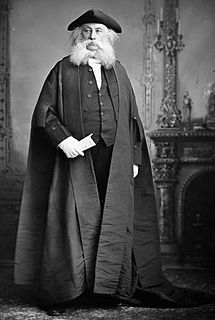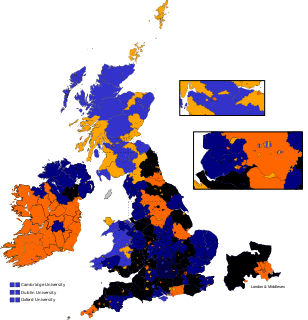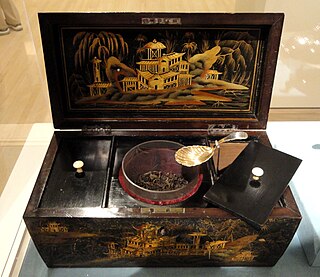Related Research Articles

Sir David Lewis Macpherson, was a Canadian businessman and political figure. He was a member of the Senate of Canada from 1867 to 1896. He was knighted for his service to the country in 1884.

James Watney Jr. was a prominent member of the Watney family and a Conservative Member of Parliament for East Surrey.

North Nottinghamshire, formally the "Northern Division of Nottinghamshire" was a county constituency represented in the House of Commons of the Parliament of the United Kingdom. It elected two Members of Parliament (MPs) by the block vote system of election.
Mjr.Aubrey William de Vere Beauclerk was a Radical British Member of Parliament (MP), who was elected to serve the dual-member East Surrey, making contributions in the Commons between 1833 and 1837, when he did not stand for re-election. One of his great-grandfathers was a younger son of the 1st Duke of St Albans (paternal-line-only), two of the others were the 3rd Duke of Marlborough and 2nd Duke of Richmond.
Henry Reginald Gamble was an Anglican priest and author. He was the Dean of Exeter in the Church of England from 1918 to 1931.

Major Edward Stanley was an English military officer who played one first-class cricket match for Somerset County Cricket Club as an emergency stand-in in 1884. Somerset had arrived in Manchester a player short for their fixture against Lancashire, and had to seek special permission to include Stanley in their team. Stanley lived in Manchester, but had been born in Somerset, and thus qualified for the county. His only first-class appearance was not successful; he did not bowl, and scored no runs in either innings of the match.
Gilbert Elliot was Dean of Bristol from 1850 until his death.
Charles King Irwin, D.D. was an eminent Irish clergyman
Daniel Collyer was Archdeacon of Malta from 1903 until 1905.
William Guise Tucker R,N, B.A., was a Church of England priest and Royal Navy chaplain. He was the inaugural Chaplain of the Fleet, serving from 1865 to 1871.
John Cawston was a Church of England priest and Royal Navy chaplain. He was Chaplain of the Fleet, serving from 1876 to 1882.
John Bradley Harbord (1812-1896) was a Church of England priest and author.
John Cox Cox-Edwards (1839–1926) was a Church of England priest and chaplain in the Royal Navy who rose to be Chaplain of the Fleet from 1888 to 1899.
Walter Edmund Matthew was an Anglican archdeacon in India in the second half of the 19th century.

Augustus Theodore Wirgman, DD was an Anglican priest in the second half of the 19th century and the early part of the 20th, most notably Archdeacon of Port Elizabeth from 1907 until his death.
Alfred Cecil Wright was an Anglican priest in the second half of the nineteenth century and the first decade of the twentieth.

Richard Fisher BelwardD.D. FRS was an academic in England in the second half of the 18th century and the early years of the 19th. He was born Richard Fisher, adopting the name Belward in 1791.
Thomas Charles Geldart, LL.D was a lawyer and academic in the nineteenth century.

Henry Kemble was a teabroker in successful partnership with his brother and Conservative Member of Parliament for East Surrey, England.
Captain Richard Alsager was a British politician and businessman who served as the Conservative MP for East Surrey from 1835 to 1841.
References
- ↑ University of Toronto Libraries
- ↑ Hamilton Cathedral
- ↑ Crockford's Clerical Directory 1885 p632 London, Horace Cox, 1885
- ↑ PREFERMENTS AND APPOINTMENTS.Bristol Mercury and Daily Post (Bristol, England), Thursday, February 19, 1880; Issue 9910. (959 words). British Library Newspapers, Part I: 1800-1900
- ↑ thePeerage.com
- ↑ FOURTH EDITION Pall Mall Gazette (London, England), Saturday, December 5, 1891; Issue 8334. British Library Newspapers, Part I: 1800-1900